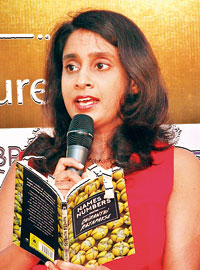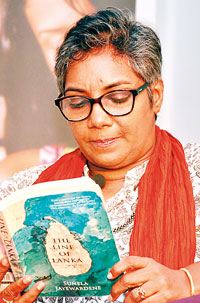Sunday Times 2
Gratiaen Prize: Three shortlisted authors share their writings
As a storm raged outside, some of the shortlisted authors for the 2017 Gratiaen Prize came together for a convivial evening where they delved into their writings in particular as well as the craft in general, within the snug library of the British Council Colombo .

Chiranthi Rajapakse. Pix by Indika Handuwala
Sunela Jayawardene, the enviornmental architect who in The Line of Lanka produced a book deeply saturated with her passion for Sri Lanka’s buried history and heritage, introduced an intriguing note to the discussion with readings culled from her journeys to far flung corners of the island, probing into folklore, myth, legend and landscape that may still remember what the people had long forgotten.
These included reconstructing the story of the historical Ravana, villified into a demon in the Indian epic. Sunela would take us on a hunt for toponymy and local tales in Balangoda, yieding exciting clues as to the real story of Ravana who commanded missiles as well as flying machines, or tracking Nittaewo, a pygmy race that once hunted in the jungles of the north east, where the Veddhas and traditional villagers still recount hair raising stories of these half human creatures.

Sunela Jayawardene
Neshantha Harischandra, meanwhile, spoke of her mother’s village that was the inspiration for her novel, a House Down Queer Street. She had always known that her first novel would be about this village which so fascinated her during Avurudu visits. She found it necessary to stress that the novel is woven around so many elements of the traditional village because this was the milieu that she always found intriguing; not because she was suffering from “what Prof. Rajiva Wijesinha called ‘the village well syndrome’; a guilt complex to assert one’s Sri Lankanness”. She read passages that fascinated with insight into the lives of a quaint village gentry or middle class of a bygone age. The book sparkled out as a social satire and a humorous, observant and sympathetic if often ironic look at this group of people no longer living and breathing.
Chiranthi Rajapakse’s readings revealed an observant eye for modern Sri Lankan life in all its variety captured in Names and Numbers, her collection of short stories. The cover of the book, a mosaic of lunu-dehi, pickled lime laid to dry in the sun, reflects the Sri Lankan ethos the stories celebrate while giving a hint of the sour-sweetness that oozes out of the tales.

Neshantha Harischandra
It was a dynamic evening when the audience interacted with the writers to create a pulsating discourse on issues like the universality of our writing, addressing audiences and the important question of editing. As the evening ended there lingered an exciting sense of the build-up to the Gratiaen, to be announced on Saturday, May 26, especially as this year’s shortlist comprises four women writers (including Jean Arasanayagam with her collection of poetry The Life of the Poet ), representing the four genres of short story, novel, poetry and travelogue/memoir.

